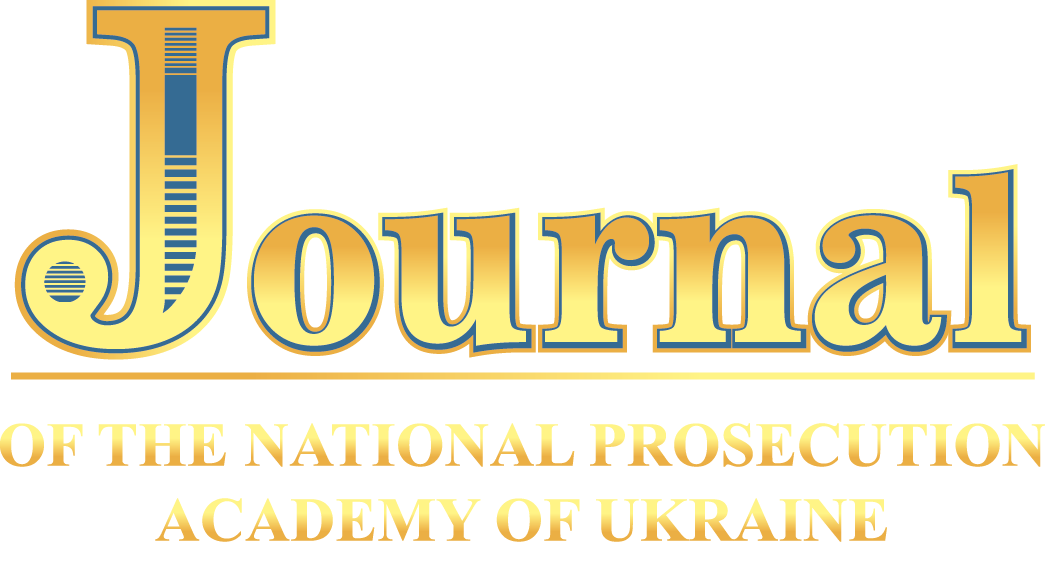| (2019) 4 Visn. Nac. akad. prokur. Ukr. 53–61 | |
| https://doi.org/10.34285/visnyknapu2019.04.053 | |
| Title of the article | The Determination of Crime: New Old Views |
| Author(s) | PAVLO SERDIUK Doctor in Law, Professor (ORCID ID 0000-0002-8519-0012), chief scientific officer, department of scientific and methodological support for the work organization of the prosecutor’s office, Scientific and Research Institute, National Prosecution Academy of Ukraine, Kyiv, Ukraine, pp_serduk@i.ua |
| Short title of the journal (ISSN) |
Visn. Nac. akad. prokur. Ukr. |
| Year | 2019 |
| Issue | 4 |
| Pages | [53–61] |
| Language | English |
| Abstract | Criminology has not evolved in crime determination for over a century, which is a great deal for science, even fundamental. However, studies carried out on this topic have led to a generalization of this insignificant methodological aspect of the material. As it turned out, today in criminology does not solve the issues raised by researchers more than a hundred years ago. The purpose of the article – to show the true methodological level of the science of criminology in the two most common concepts of crime determination. The article criticizes two approaches to understanding the determinants of crime, common in criminology: the first deals with the reduction of the causes of crime to the subjective decision of the individual; the second is the use of an accognostic methodology for determining the dominant factor in the crime. Concerning the first approach, it was emphasized that the desire of researchers to see exclusively conscious human behavior led to the conclusion that external circumstances could not cause its actions, so they noted the incorrect use of the formulation of “cause and condition”, because the crime is a combination of external and internal factors, which, in fact, are determinants of crime, or criminogenic factors. It is stated that a personal decision or installation does not play a decisive role in the crime. In turn, the essence of the accognostic methodology is that researchers see the deviant behavior of the person as dominant, in their view, the factors that caused it. That is, depending on the nature of such behavior, they also interpret the dominant factors. This solution is reminiscent of eclecticism, but it is related to the peculiarities of the interpreter's perception. It is obvious that this approach has been used since the emergence of criminological thought, and this has prevented the accumulation of knowledge about the subject. Therefore, it is imperative to give it up. The way out is to return to the positivist approach. |
| Keywords | accognostic; deviant; determination; criminality; reason; subjective component of determination; condition; factor. |
| References | REFERENCES Bibliography Authored books 1. Kozlova T, Prevention of Juvenile Delinquency (Vyshcha shkola 1990) 192 (in Russian). 2. Kudrjavcev V, Causation in Criminology (On the Structure of Individual Criminal Behavior) (Juridicheskaja literatura 1968) 176 (in Russian). 3. Vedernikova O, Theory and Practice of Fighting Crime in the UK (Rossijskaja kriminologicheskaja associacija 2001) 344 (in Russian). 4. Jakovlev A, Theory of Criminology and Social Practice (Logos 1985) 248 (in Russian). Journal articles 5. Chicheva I, ‘Theoretical Solution to the Problem of the Causes and Conditions of Crime as an Important Component of Preventive Measures’ (1988) 47 Problemy bor’by s prestupnost’ju 128−9 (in Russian). 6. Miller A, ‘What are the Causes and Conditions of the Crime?’ (2001) 5 Pravo Ukrainy 89–92 (in Ukrainian). 7. Selivanov V, Didenko N, ‘The Legal Nature of Regulation of Public Relations’ (2000) 10 Pravo Ukrainy 10–20 (in Ukrainian). 8. Shipunova T, ‘Aggression and Violence as Elements of Sociocultural Reality’ (2002) 5 Sociologicheskie issledovanija 67–76 (in Russian). 9. Tkachuk V, ‘Features of the Causal Mechanism of Unlawful Behavior of Persons Serving Sentences not Related to Imprisonment’ (2007) 2 Pravo Ukrainy 95–8 (in Ukrainian). 10. Zhalinskij A, ‘Criminological Discourse in Crime’ (2006) 8 Zakon i politika 15–22 (in Russian). |
download .PDF



